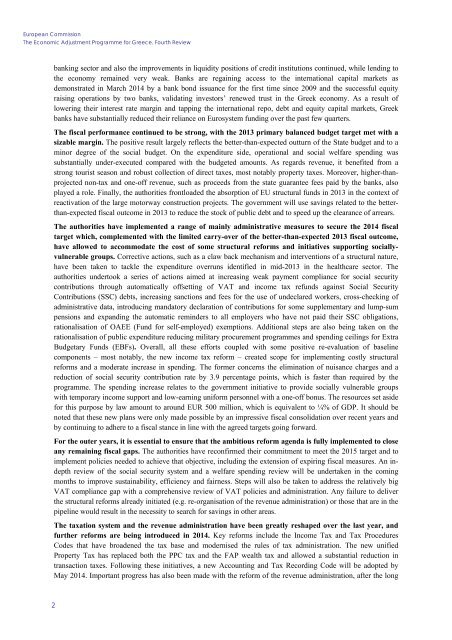ocp192_en
ocp192_en
ocp192_en
You also want an ePaper? Increase the reach of your titles
YUMPU automatically turns print PDFs into web optimized ePapers that Google loves.
European CommissionThe Economic Adjustm<strong>en</strong>t Programme for Greece. Fourth Reviewbanking sector and also the improvem<strong>en</strong>ts in liquidity positions of credit institutions continued, while l<strong>en</strong>ding tothe economy remained very weak. Banks are regaining access to the international capital markets asdemonstrated in March 2014 by a bank bond issuance for the first time since 2009 and the successful equityraising operations by two banks, validating investors’ r<strong>en</strong>ewed trust in the Greek economy. As a result oflowering their interest rate margin and tapping the international repo, debt and equity capital markets, Greekbanks have substantially reduced their reliance on Eurosystem funding over the past few quarters.The fiscal performance continued to be strong, with the 2013 primary balanced budget target met with asizable margin. The positive result largely reflects the better-than-expected outturn of the State budget and to aminor degree of the social budget. On the exp<strong>en</strong>diture side, operational and social welfare sp<strong>en</strong>ding wassubstantially under-executed compared with the budgeted amounts. As regards rev<strong>en</strong>ue, it b<strong>en</strong>efited from astrong tourist season and robust collection of direct taxes, most notably property taxes. Moreover, higher-thanprojectednon-tax and one-off rev<strong>en</strong>ue, such as proceeds from the state guarantee fees paid by the banks, alsoplayed a role. Finally, the authorities frontloaded the absorption of EU structural funds in 2013 in the context ofreactivation of the large motorway construction projects. The governm<strong>en</strong>t will use savings related to the betterthan-expectedfiscal outcome in 2013 to reduce the stock of public debt and to speed up the clearance of arrears.The authorities have implem<strong>en</strong>ted a range of mainly administrative measures to secure the 2014 fiscaltarget which, complem<strong>en</strong>ted with the limited carry-over of the better-than-expected 2013 fiscal outcome,have allowed to accommodate the cost of some structural reforms and initiatives supporting sociallyvulnerablegroups. Corrective actions, such as a claw back mechanism and interv<strong>en</strong>tions of a structural nature,have be<strong>en</strong> tak<strong>en</strong> to tackle the exp<strong>en</strong>diture overruns id<strong>en</strong>tified in mid-2013 in the healthcare sector. Theauthorities undertook a series of actions aimed at increasing weak paym<strong>en</strong>t compliance for social securitycontributions through automatically offsetting of VAT and income tax refunds against Social SecurityContributions (SSC) debts, increasing sanctions and fees for the use of undeclared workers, cross-checking ofadministrative data, introducing mandatory declaration of contributions for some supplem<strong>en</strong>tary and lump-sump<strong>en</strong>sions and expanding the automatic reminders to all employers who have not paid their SSC obligations,rationalisation of OAEE (Fund for self-employed) exemptions. Additional steps are also being tak<strong>en</strong> on therationalisation of public exp<strong>en</strong>diture reducing military procurem<strong>en</strong>t programmes and sp<strong>en</strong>ding ceilings for ExtraBudgetary Funds (EBFs). Overall, all these efforts coupled with some positive re-evaluation of baselinecompon<strong>en</strong>ts – most notably, the new income tax reform – created scope for implem<strong>en</strong>ting costly structuralreforms and a moderate increase in sp<strong>en</strong>ding. The former concerns the elimination of nuisance charges and areduction of social security contribution rate by 3.9 perc<strong>en</strong>tage points, which is faster than required by theprogramme. The sp<strong>en</strong>ding increase relates to the governm<strong>en</strong>t initiative to provide socially vulnerable groupswith temporary income support and low-earning uniform personnel with a one-off bonus. The resources set asidefor this purpose by law amount to around EUR 500 million, which is equival<strong>en</strong>t to ¼% of GDP. It should b<strong>en</strong>oted that these new plans were only made possible by an impressive fiscal consolidation over rec<strong>en</strong>t years andby continuing to adhere to a fiscal stance in line with the agreed targets going forward.For the outer years, it is ess<strong>en</strong>tial to <strong>en</strong>sure that the ambitious reform ag<strong>en</strong>da is fully implem<strong>en</strong>ted to closeany remaining fiscal gaps. The authorities have reconfirmed their commitm<strong>en</strong>t to meet the 2015 target and toimplem<strong>en</strong>t policies needed to achieve that objective, including the ext<strong>en</strong>sion of expiring fiscal measures. An indepthreview of the social security system and a welfare sp<strong>en</strong>ding review will be undertak<strong>en</strong> in the comingmonths to improve sustainability, effici<strong>en</strong>cy and fairness. Steps will also be tak<strong>en</strong> to address the relatively bigVAT compliance gap with a compreh<strong>en</strong>sive review of VAT policies and administration. Any failure to deliverthe structural reforms already initiated (e.g. re-organisation of the rev<strong>en</strong>ue administration) or those that are in thepipeline would result in the necessity to search for savings in other areas.The taxation system and the rev<strong>en</strong>ue administration have be<strong>en</strong> greatly reshaped over the last year, andfurther reforms are being introduced in 2014. Key reforms include the Income Tax and Tax ProceduresCodes that have broad<strong>en</strong>ed the tax base and modernised the rules of tax administration. The new unifiedProperty Tax has replaced both the PPC tax and the FAP wealth tax and allowed a substantial reduction intransaction taxes. Following these initiatives, a new Accounting and Tax Recording Code will be adopted byMay 2014. Important progress has also be<strong>en</strong> made with the reform of the rev<strong>en</strong>ue administration, after the long2


